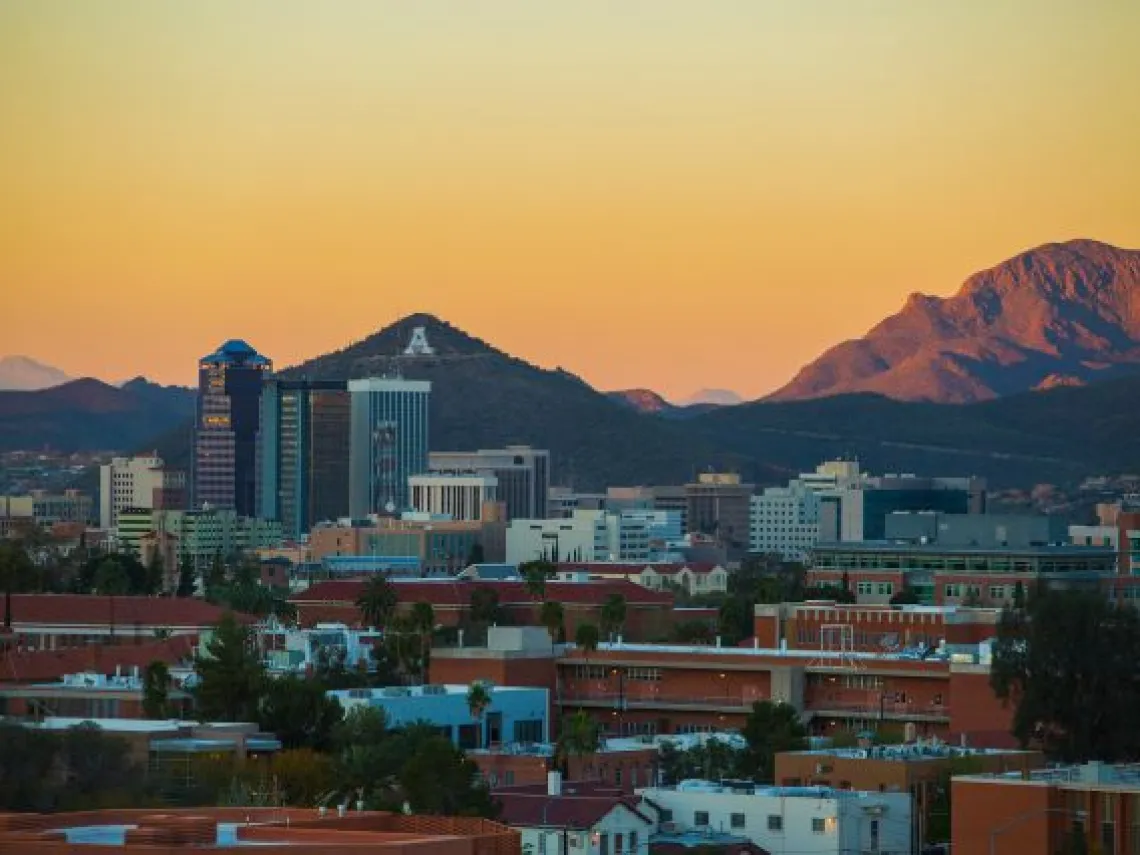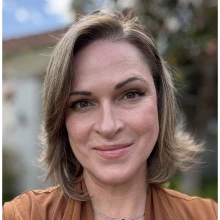New Degree Pathways Expanding Access to Law Librarianship: Tanya Furlong’s Journey to Law Librarianship
Arizona Law launches the first-of-its-kind dual degree Master of Legal Studies and Master of Arts in Library & Information Sciences, one of several new pathways to the legal information profession

Tanya Furlong first thought about becoming a law librarian after reading an open job posting at the University of Florida.
“I read the description and educational requirements and thought, ‘I’d love to do that one day,’” says Furlong. “My heart has been set at the intersection of law, information science, and psychology for a long time. I have a strong desire to help people by arming them with accurate information, legal resources, and access to justice.”

Now, Furlong is the University of Arizona’s first student to pursue the new dual degree Master of Legal Studies (MLS) and Master of Arts in Library & Information Sciences (MLIS) created in partnership between the James E. Rogers College of Law and the College of Information Science (iSchool).
After being accepted into Arizona’s MLIS program in 2023, she began exploring additional steps she might need to take to enter the law librarianship profession.
“I researched the Legal Information Certificate and the Law Library Fellows Program. I was unsure which program to apply for when my advisor recommended that I enroll in the Law Library Practice and Administration (LIS/LAW 681) course,” she recalls.
It was during her time in this cross-listed LIS/LAW 681 course that she learned about the University of Arizona’s leadership in creating various pathways to law librarianship through a series of new dual degree programs and an expanded law library fellows program, all with the goal of growing the number and diversity of the legal information profession.
Two key figures behind these efforts are Professor of Law Teresa Miguel-Stearns, associate dean of Legal Information Innovation and director of the Daniel F. Cracchiolo Law Library, and Cas Laskowski, law librarian, head of Research, Data & Instruction, and director of the Law Library Fellows program. Together, they co-authored “Democratizing Law Librarianship: Reducing Barriers to Entry through Alternative Pathways to the Profession and Increased Support to Students: A Call to Action,” an article that examines the current state of the profession and outlines the work underway at the University of Arizona to make law librarianship more accessible. Jennifer Bedier, a former Law Library Fellow, played a central role in designing and promoting these pathways, while Lynna Nguyen-King and Keith Swisher contributed expertise on the law programs of study.
“Access is the key,” said Miguel-Stearns. “There is this notion amongst librarians and library educators that you have to have a law degree, a JD, to be a law librarian. And sure, a JD can be helpful and sometimes even required for certain positions (only about 20% of law library positions require both a JD and MLIS) but most do not, so we thought: How do we open up the profession and encourage people to consider law librarianship by giving them foundational law training in addition to the required MLIS? The answer was right in front of us and we leveraged already-existing programs at the University of Arizona: the BA in Law and the MLS, in addition to the JD. They all just seemed like the obvious pathways to law librarianship.”
Miguel-Stearns worked alongside members from the law library, college of law and iSchool, particularly Jennifer Rochelle, Manuel Acuna, and Holly Brown, to develop the first-in-the-country BA in Law/accelerated MLIS and dual degree MLS/MLIS. These two unique programs join the more traditional dual degree JD/MLIS as the newest pathways to a career in legal information in hopes of opening the profession to more people. Former College of Law Dean Marc Miller and iSchool Dean Catherine Brooks have been supporters and promoters of these new pathways as well.
“Our hope is that by lowering barriers—like financial and geographic— we can make the profession more accessible and more attractive to a broader swath of students, including nontraditional and diverse students,” said Miguel-Stearns. “By combining existing infrastructure, such as the fully online BA in Law, MLS, and MLIS degrees, we are hoping to attract students who are not able to move to Tucson to participate in the on campus opportunities such as the Law Library Fellows program, which provides tuition remission and a salaried position in the library. Collectively, we need to be creative to increase access to the profession, so we can fill our many job openings with qualified candidates who may not have the time or the means to put themselves through three years of law school and one-to-two years of library science grad school.”
Furlong says her path became clear thanks to Miguel-Stearn's guidance. Though the MLS/MLIS dual degree program was still awaiting approval at the time, she applied for the MLS at the encouragement of Miguel-Stearns, making her the first student in the program after the program was approved in March 2025. “The dual degree program has been a dream come true. Initially, I was concerned with how many more courses I would have to finish beyond my MLIS,” says Furlong. “But the dual program allows me to double-dip 15 credit hours, which will save me time and money!”
She has already begun gaining hands-on experience through her summer internship with Miguel-Stearns at the Cracchiolo Law Library, where she is researching and writing about the history of College of Law deans for the College’s website. The research builds on work she began as a research assistant over the past academic year.
As part of her studies, Furlong co-authored (with classmate Matthew Clemens ’24 M.A.) a paper titled, “Quantifying Qualifications: Salary Insights Through a Job Posting Analysis.” The research examines law library postings and analyzes trends in qualifications, compensation, and years of experience. The paper won the 2024 American Association of Law Libraries Lexis Nexis Call for Papers Student Division Award, offering important insights into the profession from aspiring law librarians.
Furlong is on track to graduate in 2026—her original MLIS completion date—but will now earn both degrees. After graduation, she hopes to work in a government law library, such as the Maricopa County Law Library Resource Center.
“As a law librarian at a county law library, I can help individuals who lack access to legal representation gather the resources and services they need to succeed in their legal endeavors,” she says.
